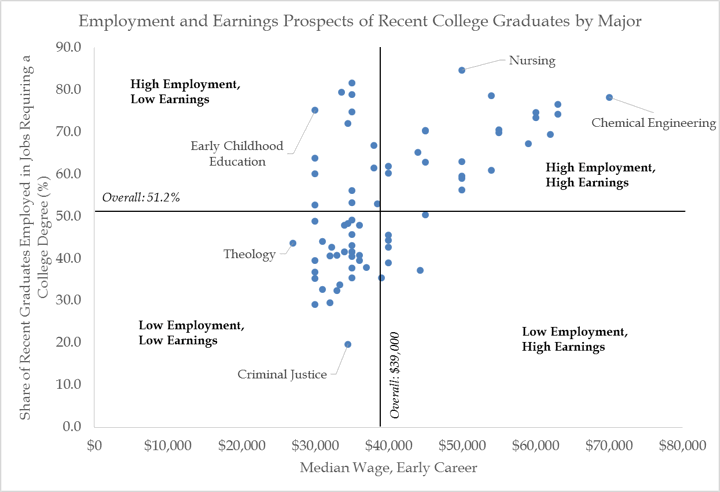 The American Enterprise Institute used newly-released New York Fed data in their article Major matters in the job market for college graduates. (They probably could have tried harder in their title choice.)
The American Enterprise Institute used newly-released New York Fed data in their article Major matters in the job market for college graduates. (They probably could have tried harder in their title choice.)
More specifically, they found that high employability doesn’t always match up with higher earnings. In the following chart, the plotted the percentage of recent college graduates with jobs requiring a college degree against the median wage of those recent graduates.

Here are some sample majors for each of the four quadrants:
- High rate of “full” employment, higher earnings. Chemical Engineering, Nursing, Economics, Accounting, and most majors in the STEM fields.
- High rate of “full” employment, lower earnings. Education-related majors.
- Low rate of “full” employment, higher earnings. Political Science, Marketing, and International Affairs.
- Low rate of “full” employment, low earnings. Theology, Criminal Justice, Performing Arts, English Literature, History, and Philosophy.
Solely following your passions sounds nice, but consider these survey results stating that English majors have the highest rate of regret. I plan on showing my kids this handy Venn diagram along with asking them the Three Questions That Will Guide You Towards The Right Job:

Bottom line. The AEI article concludes with “Your college major matters. But it matters in more ways than one.” The data suggests the following warnings:
- Just because there are lots of jobs in your chosen field, that doesn’t mean your job will pay well.
- Just because your major has high average income, that doesn’t mean you’ll be able to find a job in that field.
College Majors: Job Availability vs. Average Salary from My Money Blog.
© MyMoneyBlog.com, 2017.
Read More: College Majors: Job Availability vs. Average Salary







